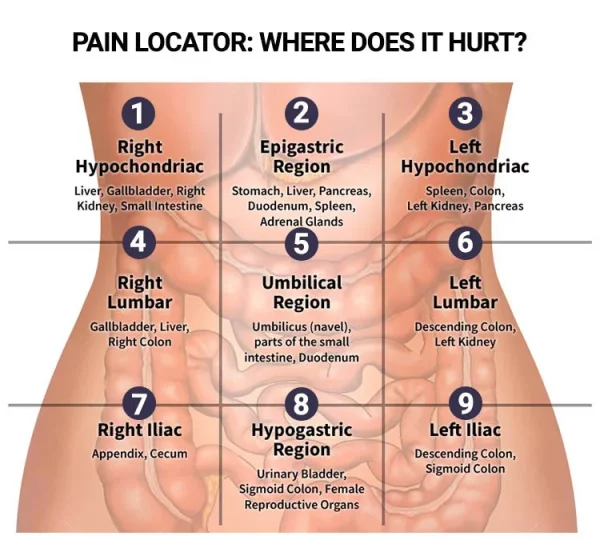Epigastric pain is a common symptom often characterized by discomfort or pain in the upper abdomen, right below the breastbone. This is not merely a typical occurrence but can also signal serious health concerns that require proper understanding and management. Epigastric pain can manifest suddenly or persist over time, stemming from various causes.

One of the primary causes of epigastric pain is peptic ulcer disease, accounting for approximately 70-90% of diagnosed cases, according to the World Health Organization (WHO, 2021). This condition occurs when the stomach lining is damaged due to an imbalance between digestive acid and protective mechanisms. Major causes include Helicobacter pylori infection and overuse of nonsteroidal anti-inflammatory drugs (NSAIDs). Additionally, unhealthy diets, smoking, and stress significantly contribute to the risk.
Another potential cause of epigastric pain is gastroesophageal reflux disease (GERD). This condition involves stomach acid refluxing into the esophagus, leading to irritation and inflammation. According to research by the American College of Gastroenterology (2020), GERD affects over 20% of the global population, with pain or burning sensations in the epigastric region being hallmark symptoms. These typically occur after large meals or lying down immediately post-eating and are often accompanied by heartburn or acid regurgitation.
“If left untreated, conditions associated with epigastric pain can lead to severe complications such as gastrointestinal bleeding, esophageal stricture, or even stomach cancer.”
Additionally, epigastric pain may arise from gallbladder disease, such as gallstones or cholecystitis. When gallstones block bile flow, they cause intense pain that often radiates to the right shoulder or back. According to the National Institute of Diabetes and Digestive and Kidney Diseases (NIDDK, 2019), approximately 10-15% of adults in the United States have gallstones, particularly women and individuals with obesity.
Less common but noteworthy causes include pancreatitis, myocardial infarction, and hepatobiliary issues. Acute pancreatitis, for instance, triggers severe epigastric pain, typically accompanied by nausea and vomiting. A study by the Mayo Clinic (2022) indicates that about 30% of acute pancreatitis cases are linked to alcohol abuse, with the remainder primarily caused by gallstones or medication effects.

To manage epigastric pain, identifying the exact cause is crucial. In addition to using medications prescribed by healthcare providers, lifestyle modifications play a significant role in alleviating symptoms. A healthy diet, avoiding irritants such as spicy, acidic, or greasy foods, and limiting alcohol and tobacco use can all improve the condition.
A study from Harvard Medical School (2020) also highlights the importance of stress management in reducing the risk of epigastric pain, as stress increases stomach acid secretion and impairs the stomach lining’s protective capacity. Relaxation techniques such as yoga, meditation, or deep breathing exercises are recommended for effective stress relief.
“Understanding the causes of epigastric pain not only enables effective treatment but also paves the way for comprehensive lifestyle changes to prevent recurrence.”
Finally, if the pain persists, worsens, or is accompanied by unusual symptoms such as unexplained weight loss, vomiting blood, or black stools, you should seek immediate medical attention for thorough evaluation and timely treatment.


HPX24h > Health > What Is Epigastric Pain and What Causes It
Top Reads from This Category
Health
E. Coli In The Gut May Trigger A ‘Chain Reaction’ Leading To Parkinson’s Disease
Health
Fruits That Can Spike Blood Sugar Levels: Be Cautious
Health
5 Tips to Help You Overcome Smartphone Addiction
Health
Forgetfulness Can Bring Unexpected Evolutionary Benefits
Health
Daily Habits to Naturally Manage Blood Pressure Without Medication
Health
Unlocking the Mystery: How the Brain Controls Body Weight
Health
The Best Days to Get Pregnant: How to Accurately Time Your Ovulation?
Discover New Topics
Science
Your Body Is Not the Same as It Was 10 Minutes Ago: The Continuous Regeneration Process of the Human Body
Science
Turning Dreams On and Off with Brain-Control Technology: A Breakthrough in Sleep Researc
Fitness
Which Exercise Burns the Most Calories? Tips for Choosing and Training Effectively
Uncategorized
Bài Tiếng Việt
Science
Discovering Enzymes That Stimulate Hair Regrowth: A New Opportunity in Hair Loss Treatment
Health
Chemicals in Cosmetics That Could Increase Breast Cancer Risk – Did You Know?
Animals
The Stunning Image of a Cheetah in Action During Its Hunt
Fitness
Effective And Safe Methods To Strengthen Your Knees: Proven Tips For Optimal Performance
Space
18 New Planets: Unlocking the Gateway to Exploring Giant Star Systems
Health
Can Gray Hair Be Restored? What Science Says About Regaining Natural Hair Color
Parenting Tips
The Way to Help Preschoolers Understand How Babies Are Made
Animals
The Potential of Black Mamba Venom in Developing New Painkillers
Healthy Eating
How Many Calories Do You Need Each Day to Maintain Optimal Health?